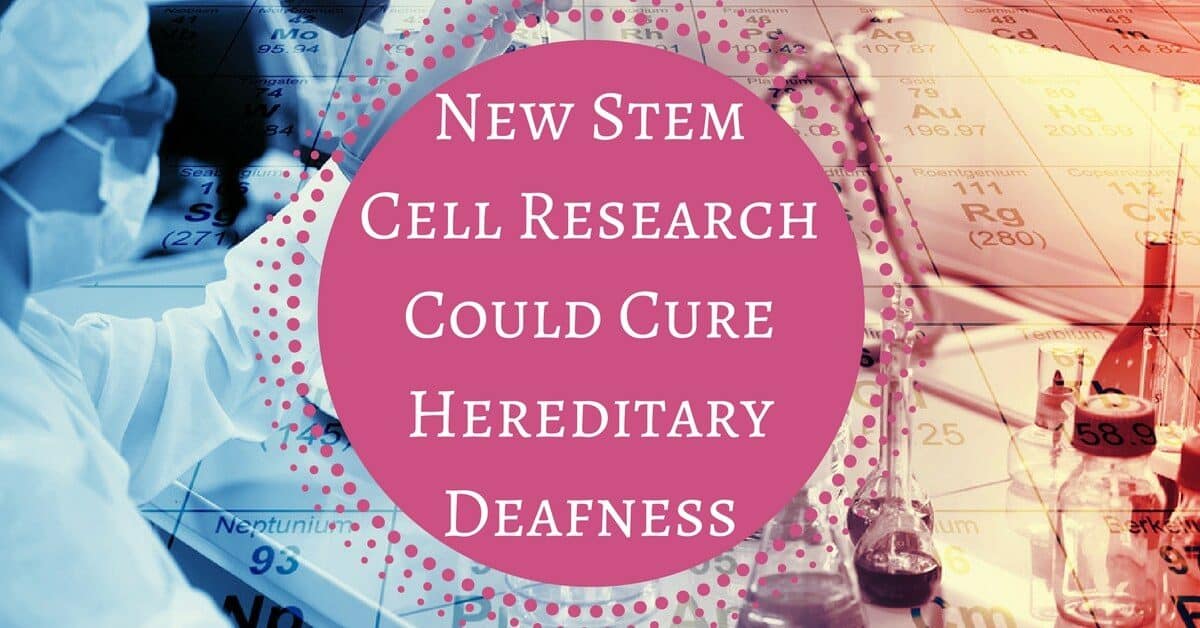Researchers continue to amaze us with new discoveries and treatments that can change lives. The latest buzz is from the field of stem cell research, and this is exciting news for those who’ve been deaf since birth, or have young children suffering from hereditary hearing loss. Scientists think they may be close to finding a cure for hearing loss!
What Causes Hereditary Hearing Loss?
There are more than 11,000 hair cells in each of your ears, deep within the inner ear, or spiral-shaped cochlea. They are the sound receptors of your ear, and each one plays an important part in transmitting sounds from the outside world to your brain. In acquired hearing loss, these hair cells get damaged with age or exposure to loud noises, and they are not able to function properly.
In many cases of hereditary hearing loss these hair cells have not developed properly due to a gene mutation present before birth. Without functioning hair cells, the ear can’t work properly. Even though there is nothing wrong with the outer ear or with the neural pathway, sounds are never transmitted to the brain. The mutation is of a gene called Gap Junction Beta 2, and it’s the reason behind hereditary deafness and hearing loss in 1 in every 1,000 children.
Current treatments for Hereditary Hearing Loss
For those suffering from hereditary hearing loss, there are very few treatment options available. The current treatment is to use an artificial cochlear implant, a device that takes over the job of the inner ear. It catches sounds resonating in the outer ear, and transfers these sounds to the nerves that send sound signals to the brain. For some forms of hearing loss, the prescription of hearing aids is useful for amplification.
Stem Cell Therapy
Soon implants may not be the only way to treat hereditary hearing loss. New research in stem cell therapy is making leaps and bounds towards finding a cure for deafness. Normal hearing could be restored without the use of a hearing device or implant!
What Are Stem Cells
Stem cells are the beginning stages of all the cells in the body. An embryo’s stem cells go through rapid growth and change in the womb, as all the different types of cells it needs to survive are developed. Stem cells are the basic building blocks of the body, and even though they specialize as the body grows, at the beginning they’re almost identical. Since they can develop into any cell in the body, stem cells have amazing treatment potential, and can be used to repair damaged cells or to replace cells that are absent from birth. Stem cells are used to treat both adults and children, either repairing damage, or replacing cells that never developed properly.
Stem Cell Research for Hereditary Hearing Loss
A leader in stem cell research is professor Kazusaku Kamiya, a specialist in ear diseases who runs a lab at Juntendo University in Tokyo, Japan. The team at Juntendo University are growing stem cells to replace the mutated hair cells that are responsible for hereditary hearing loss. “We hope this work will lead to a cure for a form of hereditary deafness” says Kamiya, who reports that their lab has already found a way to make cochlear stem cells. This is a far better solution for hereditary hearing loss than a cochlear implant since stem cells will restore the natural function of the hair cells in the inner ear.
When Will Stem Cell Therapy be Available?
The next stage of the research is to find a way to safely implant these stem cells into the ear. Through surgery, they hope to plant stem cells into the cochlea where they will fuse with the cells of the inner ear and develop as normal hair cells, restoring natural hearing.
If there was a cure for your child’s hearing loss, would you jump at the chance? We’re all eagerly waiting for this revolutionary stem cell research to develop into a viable treatment option. Researchers say it may be as little as 5 to 10 years before stem cell treatment is available for hereditary deafness, or even as a treatment for sensorineural hearing loss later in life. Correcting gene mutations with stem cells might be the key to restoring hearing, and could change the lives of children born deaf.
Treating Hearing Loss Now
Until these new treatment options are available, the best option to treat hearing loss is the use of hearing aids. Hearing aids are advanced and sophisticated devices, discreet in size, and packed with powerful features to amplify sound and provide clarity for those with hearing loss.
Do you experience hearing loss? To learn more about how hearing aids can help you, contact us at one of our My Hearing Centers locations.
My Hearing Centers
With over 50 locations, there is sure to be a My Hearing Centers location near you. Reach out to us today.
(888) 230-0875


